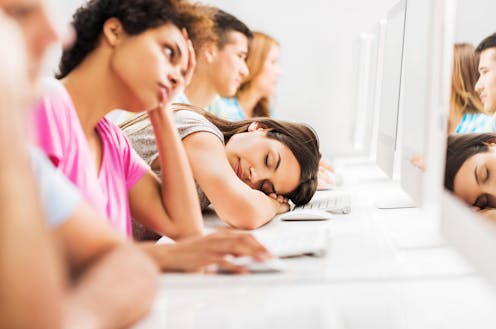 Most college students get less than seven hours of sleep per night. skynesher via Getty Images
Most college students get less than seven hours of sleep per night. skynesher via Getty Images
The Research Brief is a short take about interesting academic work.
The big idea
Small financial incentives can get college students to go to bed earlier and sleep significantly longer. That’s what my colleagues and I found through an experiment that involved 508 students at the University of Pittsburgh and the University of Oxford.
People are also reading…
When the students were offered US$7.50 per night Monday through Thursday — a total of $30 per week — to sleep longer, they were 13% more likely than those who were not offered the incentive to sleep seven to nine hours. They were also 16% less likely to sleep fewer than six hours.
We collected data from wearable activity trackers, surveys and time-use diaries. The people to whom the incentives were offered were chosen randomly from the group of people who agreed to be part of the study.
The incentives were offered for three weeks, but the effects lasted even after they were removed. Specifically, those who had initially gotten the incentives were still 9% more likely to sleep seven to nine hours per night for up to six weeks after students stopped receiving them. This suggests the effects of the incentives may last for several weeks.
The time-use diaries documented a reduction in screen time. That is, students spent less time watching TV and videos or using smart devices during the experiment. There was no evidence of a decline in time spent studying or in time spent socializing. This suggests students gave up screen time rather than time with friends to get to bed earlier and sleep longer.
Why it matters
Sleep deprivation has been recognized by the Centers for Disease Control and Prevention as a public health epidemic. It can have adverse effects on people’s physical and mental health, decision-making and productivity. Our findings shine light on what it takes to get people to adopt better sleeping habits and avoid these negative outcomes.
Sleep deprivation is a big problem among college students. Most college students sleep less than the recommended minimum of seven hours per night.
Good sleep is associated with better academic performance. Sleep deprivation and poor sleep quality have been linked to mental health problems among college students.
Since college often marks the first time young adults may find themselves fully in charge of their schedules, they could benefit from help or incentives to form good sleep habits.
Multiple surveys indicate that many people feel they are not getting enough sleep. When people experience a night of poor sleep, the effects are felt the next day.
Our results suggest that just knowing about the benefits of good sleep is not enough for people to actually adopt better sleeping habits. Rather, it may take incentives.
Interventions that help individuals form routines, such as reduced screen time, may have longer-lasting effects.
What is still unknown
A relevant question is whether similar people can be motivated to get better sleep without monetary incentives and with less costly nudges.
What’s next
In the future, we plan to explore whether interventions to improve sleep habits during college may also help students boost their academic performance. We’d also like to examine whether these interventions can work with different populations and in different places.
Osea Giuntella received funding from the John Fell Foundation (University of Oxford) and the Healthy Lifestyle Institute (University of Pittsburgh).
This article is republished from The Conversation under a Creative Commons license.
Here are three ways focusing on the breath can help you on your way to a better snooze.
When suffering from back pain the last thing you want to do is get out of bed. However, for most people suffering from back pain, the path to …
Traveling itself can be stressful enough without the prospect of something happening to your luggage.
We all want to feel fit and healthy, but keeping fit can sometimes be expensive. Here are three tips for how you can save some money while sti…
Adding spices to your food and drink has immeasurable amounts of health benefits but caution is advised. Yair Ben-Dor has more.
If you live in a cold climate or don’t have enough outdoor space then follow these tips to grow some tasty tomatoes indoors.
Many of us will be all too familiar with muscle knots. They’re sore spots that form when bands of muscle become tight and sensitive.
Experts explain how parents can help their child make friends post the big pandemic pause. Trinity Chavez has the details.
The Notorious B.I.G. once said, “Mo money, mo problems.” Since your money problems aren’t going away anytime soon, here’s how to face them.
Pet owners may be shocked to find out that dogs and cats can become very sick from eating bouquet-favorite flowers. Buzz60’s Maria Mercedes Ga…
Despite Americans living longer than ever, potential health issues are bound to creep up – on both your body, and your wallet.
As daunting as it can seem, learning how to successfully set clear boundaries with your friends is important.
Have you considered how your diet, and the food you eat later in the day, can impact your sleep? Elisabeth Clare, founder and director of MBST…
When you land a job you should not only be thinking about negotiating your salary, there are three other benefits you should negotiate before …
Stay connected with us on social media platform for instant update click here to join our Twitter, & Facebook
We are now on Telegram. Click here to join our channel (@TechiUpdate) and stay updated with the latest Technology headlines.
For all the latest Health News Click Here
For the latest news and updates, follow us on Google News.
